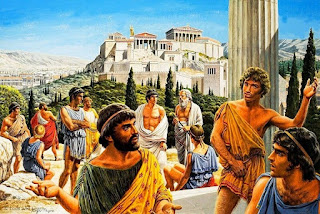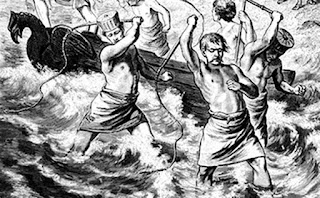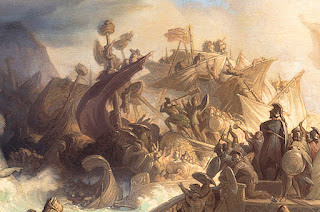NOTE: I'll continue to post this disclaimer. The past several posts and who-knows-how-many-posts to-come are merely what I can remember from Our Lady of Barnum Avenue and history class at Stratford High School. I will research some specifics, mostly dates and the most obscure of names, and I'll try to place historical events in their proper historical context. Meaning, I won't have the Aztecs land on the moon. Or...did they? Trust me, some of this is true; however, don't use any of this nonsense to prepare for the History Advanced Placement Examination. If you do, the only college you'll get into is Klown Kollege and you'll probably be confused for Alexandria Ocasio-Cortez. Or Joe Biden. Especially if you sniff their hair.
When last we met...oops, when last we met, I was talking about September 11th. Okay, when last we met, once removed...
Finally, after calling for some help from the Trojan AAA office, bridges were built and the army invaded Greece. Threatening local people with the loss of their lands, rape of their women, and vicious titty-twisters, Xerxes picked up allies along the way. Thessaly, Thebes, Argos, and France took up the Persian banner as Xerxes moved to face his greatest foes, Athens and Sparta.
 |
| France immediately surrendered |
Taking up winter quarters in Sardis, because there was no sense visiting nude beaches in the winter, Xerxes set out in the spring of 480 BC. His fleet and army had been estimated by Herodotus (noted drunk) to number 1,000,000, along with 10,000 elite warriors known as the Immortals (the Avengers having bowed out because the Hulk couldn’t find a suit of armor which fit).
 |
| "Tell them we're in the shower." |
First concentrating on Sparta rather than Athens, the Persian army clashed with 300 warriors led by King Leonidas at Thermopylae. Even though initially rebuffed by fierce Spartan resistance, rock-hard abs, and an inability to understand why the Spartan king had a Scottish accent, the 300 were slaughtered after a traitor showed the Persians the rear entrance (ancient Greeks being very familiar with rear entrances).
 |
| "THIS...IS...SPARTA!!!" |
 |
| Including a topless Cersei Lannister |
 |
| Which is better than this shot. NOTE: Since this is a family blog, I won't include full frontal nudity. If that kind of thing turns you on, get HBO. Perv. |
 |
| "Eff." |
After Sparta, Athens was captured. Some historians claim Xerxes ordered the cradle of democracy burned while Persian scholars claimed he did nothing of the sort. Who would be crazy enough to destroy a major center of trade and commerce?
Oh, I don’t know. Anyone who’d whip water a couple hundred times?
 |
| "Call me crazy but this seems...crazy." "Hey, it's better than fighting the Spartans. Have you seen their abs?" |
 |
| "Ooh, now that doesn't look good." |
To continue to kill each other.
In 465 BC, Xerxes was murdered by Artabanus, commander of the royal bodyguard (how frikkin’ ironic is that?).
What transpired next has led to confusion among historians (hey, cut them some slack. It was almost 1,500 years ago and Al Gore hadn’t invented the internet yet). Let’s see...Artabanus accused Crown Prince Darius of the murder and persuaded his brother, Artaxerxes to kill him.
 |
| "I shall call you 'Artaxerxes." Meaning 'Bitch of Xerxes.' How do you like them apples? Bitch." |
So, there was probably a little resentment there.
However, according to Aristotle, noted Greek philosopher, mentor to Alexander the Great, and owner of a chain of diners in the Peloponnesus, Artabanus killed Darius first before killing Xerxes with the help of a eunuch, who undoubtedly was cranky because he hadn’t had his coffee. Then, once Ataxerxes found out who the real culprit was, he whacked Artabanus.
 |
| "A eunuch? That's nuts!" "Not really." |
Xerxes-one of the great leaders of the ancient world, source of pride for the Persian people and reason why the letter ‘X’ is pronounced like the letter ‘Z.’ After all, it's not like they've had a whole lot to brag about since then.
There’s much more to his story, to be sure. For instance, I omitted the details of his public works initiatives, construction projects, religious beliefs, and his tempestuous 72 day marriage to Artossa Kardashian. Yes, he was much more than a megalomaniac bent on assimilation of all the peoples of the known world.
He also liked body piercings.
 |
| "And balloon animals." |
But, like what Hillary Clinton looks like naked, I’ll just leave that to your imagination.
You may want to get that imagination steam-cleaned though.
Fin
Thank God, amirite?
















